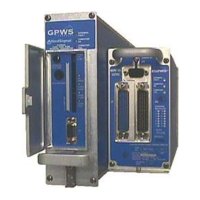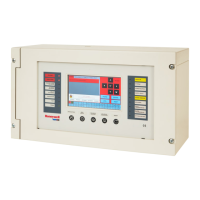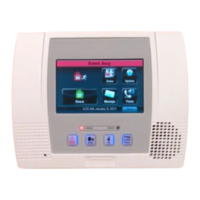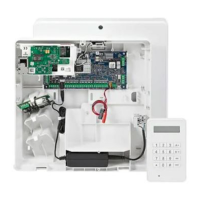Do you have a question about the Honeywell MK VI and is the answer not in the manual?
Introduction to Honeywell's Enhanced Ground Proximity Warning System (EGPWS) and its models.
Details on document number, revision, and release date.
Information on document ownership, confidentiality, and usage limitations.
Details on typed signature approval process for the document.
Records of document revisions, dates, and approvals for EGPWS updates.
Details of EGPWS document revisions E, F, and G, including ECOs.
Lists and explains various external faults related to discrete inputs.
Lists appendices covering optional EGPWS functions.
Defines the manual's purpose and scope for line maintenance operations.
Lists applicable EGPWS models (MK V, VI, VII, VIII, XXII) and their part numbers.
Lists specific documents for MK V and MK VII EGPWS models.
Lists specific documents for MK VI, MK VIII, and MK XXII EGPWS models.
Explains the purpose and function of the EGPWS to prevent CFIT and windshear accidents.
Visual representation of EGPWS components and data flow.
Details the EGPWC as a Line Replaceable Unit (LRU) and its models.
Describes the "SINKRATE" and "PULL-UP" alerts for excessive descent.
Alerts for high terrain closure rates with "TERRAIN" and "PULL-UP" enunciations.
Alerts for excessive altitude loss after takeoff or go-around.
Alerts for unsafe terrain clearance based on phase of flight, height, and speed.
Alerts for excessive glideslope deviation with "GLIDESLOPE" enunciation.
Optional aural callouts for altitude, minimums, and bank angle.
Lists available Mode 6 callouts and their applicability to different EGPWS models.
Callout for excessive bank angles to enhance situational awareness.
Tail strike alert function for rotary wing aircraft.
Alerts for hazardous windshear conditions.
Improves alert protection and expands margins at identified key locations.
Alerts for insufficient terrain clearance near airports.
Describes the earth's surface data divided into grid sets and cells.
Data records for airport runways supporting enhanced EGPWS functions.
Monitors terrain to provide rapid audio and visual alerts for threats.
Enhances terrain display by viewing terrain below aircraft safely.
Computed altitude for optimal EGPWS function across all flight phases.
Automatic Weather Radar tilt angle capability for optimum tilt.
Describes how EGPWS drives cockpit annunciators and EFIS displays.
RAAS provides aural advisories for runway awareness and approach safety.
Enhances safety by providing advisories for unstabilized approaches.
Detects incorrect altimeter setting or pressure altitude system problems.
Alerts flight crew on improper flap setting prior to takeoff.
Provides alerts for landing position during landing phase.
Alerts flight crew on airspeed dropping below 70% of amber band.
Defines illumination logic for caution (amber) and warning (red) lamps.
Defines alternate illumination logic for caution and warning lamps.
EGPWS is an "on-condition" system with no scheduled maintenance.
Discusses system status indications during INOP conditions.
Details the extensive BIT capability of the EGPWC.
Describes front panel indicators and user interfaces for troubleshooting.
Self-Test switch for activating system self-test features.
Headphone jack for use during Self-Test.
PCMCIA card slot for data downloading and database updates.
Provides access for EGPWS signal monitoring and maintenance functions.
Details the six levels of EGPWS self-test.
Methods for identifying system and sensor faults.
Uses front panel LED status to guide troubleshooting actions.
Provides a Go/No Go confidence test for EGPWS functionality.
Lists possible preamble results and their probable causes/actions.
Describes the sequence of outputs during a short Level 1 Self-Test.
Details the continuation of Level 1 Self-Test with more alerts.
Enunciates all faults existing at the time of the test.
Details internal EGPWC faults and their probable causes.
Details external faults from sensors, systems, or wiring.
Provides examples of external faults and their reasons.
Lists more external faults, including bus, signal, and discrete faults.
Defines failure identifiers and their priority for faulted signals.
Messages indicating GPS/GNSSU navigation issues.
Enunciates EGPWC configuration information.
Lists specific configuration data displayed during Level 3 Self-Test.
Lists enabled/disabled options and selected configuration features.
Continues listing configuration options and selected features.
Lists configuration options specific to the MK XXII model.
Enunciates faults recorded over the last 10 flight legs.
Details the information presented during Level 4 Self-Test.
Enunciates alerts (cautions and warnings) recorded over the last 10 flight legs.
Details the information presented during Level 5 Self-Test.
Verifies proper function and wiring of discrete inputs.
Explains how discrete input status changes are annunciated.
Details on Radio Altitude, GND Landing Gear, and +28V Landing Gear discretes.
Covers GND/28V Flap, Flap Position, and Self-Test discretes.
Details Steep Approach and ILS/VOR tuning discretes.
Covers Glideslope Validity, Inhibit, and Cancel discretes.
Details Decision Height and Mode 6 Volume Control discretes.
Covers Audio Suppress and AOA Validity discretes.
Details Display Select and Terrain Awareness/TCF Inhibit discretes.
Covers Simulator Reposition and Weather Radar On/Off discretes.
Details Localizer and Attitude Validity discretes.
Covers Airspeed and Barometric Altitude Rate Validity discretes.
Details Acceleration and Magnetic Heading Validity discretes.
Covers AOA Vane Heater and PLI Deselect Switch discretes.
Details Autopilot Disconnect and Tactical Select discretes.
Covers Altitude Alert and Corrected Barometric Altitude Validity discretes.
Details Momentary Flap Override and Weight On Wheels discretes.
Covers GPWS Inhibit and RAAS Enable discretes.
Details RAAS Inhibit and Stabilized Approach Monitor Enable/Inhibit discretes.
Covers Low Airspeed Monitor Inhibit discrete.
Covers obtaining, updating, and loading EGPWS databases.
Procedure for downloading flight history data from EGPWC.
Procedure for transcribing flight history data.
Steps for programming the configuration module using WinVIEWS.
Procedure for reprogramming the configuration module.
Example of CUW command string and its definition.
Procedures for removing and installing the EGPWC unit.
Procedures for removing and installing the Configuration Module.
Procedures for removing and installing display switching relays.
| Brand | Honeywell |
|---|---|
| Model | MK VI |
| Category | Security System |
| Language | English |












